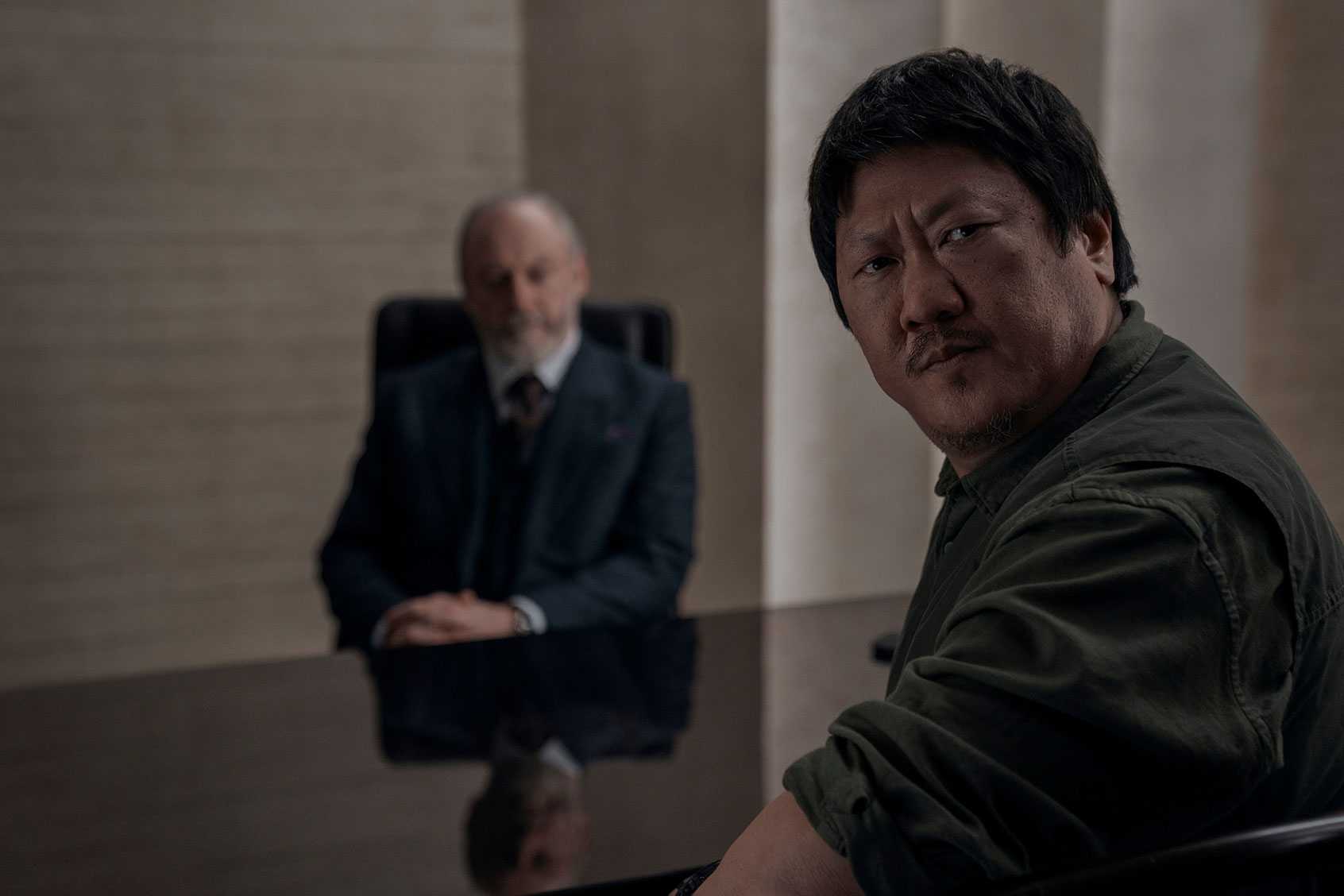It doesn't take long to decide whether Netflix’s “3 Body Problem” is extraordinary or a disarranged travesty. That decision rests on a variety of personal inclinations, including how open someone who has read author Liu Cixin’s novels may be to D.B. Weiss and David Benioff’s liberal interpretation of the novel’s aspects, along with co-creator Alexander Woo.
For one, the book’s main protagonist has been split into a group of scientists called the Oxford Five, all of them young and charismatic with made-for-TV specificity.
In case that part escapes us the band’s resident stoner Saul Durand (Jovan Adepo) – there’s at least one in every academic squad, don’t you know – ribs another, Auggie Salazar (Eiza González) by telling her she’s beautiful, but in a “boring way,” like an actress who only qualifies for movies like “Speed 3.”
That seems cruel when read out of context, but it’s a joke she invites willingly, and at a point when the two realize that allowing Fermi’s paradox stand might have been better for humankind: Maybe there is other intelligent life in the universe, and maybe we haven’t met them for good reasons.
The question of how much hard science the average viewer wants in their sci-fi is also relevant, although “Game of Thrones” executive producers Weiss, Benioff and Woo make these concepts commonly accessible.
Liu’s novels swim through game theory, quantum mechanics and dimensional physics, along with other super-geeky concepts that would combine to create a high bar of entry for the typical viewer. This isn’t my take on the books, since I haven’t read them, but that of someone who has read them and harbors doubts about this interpretation.
Their concerns are probably shared by the millions who made Liu’s “Remembrance of Earth’s Past” trilogy international bestsellers after the first book was translated into English a decade ago.
 Eiza González in "3 Body Problem" (Netflix)
Eiza González in "3 Body Problem" (Netflix)
Maybe there is other intelligent life in the universe, and maybe we haven’t met them for good reasons.
But I doubt others will mind this version’s deviations from a text that studio executives considered to be unadaptable for many years. So was “Game of Thrones,” which Weiss and Benioff distilled into an international blockbuster. As long as an interpretation follows a story’s spirit as it tames sprawling storylines into narratives we can wrap our heads around, people are willing to forgive a great deal.
We may have rescinded that for absolution for Weiss and Benioff by the end of “Game of Thrones,” but it started well enough. From the perspective of someone coming into the story cold, the same is true here.
Mind you, there will be people who resent the simplification of Liu's plot into what initially presents as a mystery winding between reality and virtual reality, making the two indistinguishable for some. Characters are introduced who are corporeal and do things that only an actual person can do, like light a cigarette or commit murder, but don’t show up on any video recordings.
Ditto for the sky, which blinks on and off like a light one night. Everyone on the planet sees this, but mechanical devices don't register any anomalies. Meanwhile inside of a game’s universe humans survive by dehydrating to a flatness that enables others to roll them up and carry them around like a yoga mat.
This is not a binge to be undertaken lightly, if at all; frankly, this should have been a weekly drop. Why streaming services insist on dropping entire seasons of shows like this while dribbling out brain candy like “Love Is Blind” incrementally is beyond me.
Inevitably, then, some will be turned off by its density. One person’s methodical structuring is what another might deem pokey or too much effort for a piece of entertainment. That isn’t entirely wrong because it takes on quite a bit. Besides interlacing environmental, scientific and social themes that whirl through zealotry and nihilism, it’s also a first-contact scenario that forces a reckoning.
This version of cosmic judgment reflects on another paradox, that which is inherent to being human. Trees provide oxygen, yet we destroy forests in the name of progress. We claim to value truth but find lies seductive. Scientific development makes our lives better, but when it questions the universe’s inner workings, we cast it aside.
Our lack of consideration for our planet will lead to our undoing. That’s no mystery – we’re soaking in our unwillingness to curb our greed, and right now that’s raising sea levels. “3 Body Problem” simply shifts the equation ever so slightly, placing our doom 400 light years away while convincing humankind that it is real and on its way to us.
Liu’s trilogy spans millions of epochs and eventually reaches beyond Earth — a challenge for any TV creator but one Weiss, Benioff and Woo can tackle later. For the majority of these eight episodes, we travel between two timelines, starting in the 1960s with a student-led struggle session during China’s Cultural Revolution.
This is where a young woman, Ye Wenjie (Zine Tseng), watches Maoists murder her father, a prominent physicist, and force her mother to denounce him to save her own skin. This lesson worms into Ye’s psyche with greater force than any physics principle. A prodigy in her own right, she’s recruited for a secret Chinese government program.
One person’s methodical structuring is what another might deem too much effort for a piece of entertainment.
Several decisions she makes during that period alter humanity’s trajectory, influenced in part by a chance meeting with an American environmentalist named Mike Evans (Ben Schnetzer).
Another act profoundly resonates decades later, in our present, when lab tests across the globe begin spitting out nonsense. Auggie, who is on the verge of a nanotechnology breakthrough, begins seeing numbers appear out of thin air shortly after her mentor and Saul’s supervisor Vera suddenly kills herself.
They reach out to their schoolmates Jack Rooney (John Bradley), who traded in a life of research and academia to create a snack and beverage empire, along with Will Downing (Alex Sharp), who teaches physics to high schoolers.
He quietly pines away for Jin Cheng (Jess Hong), Auggie’s best friend, a theoretical physicist for who can’t resist complicated riddles – including the purpose of a futuristic virtual reality visor that Vera’s bereft mother (Rosalind Chao) gives to Jin.
 Benedict Wong in "3 Body Problem" (Netflix)Vera is one of many scientists worldwide who die by suicide for reasons nobody can explain, and without warning or clues — aside from those visors. Their cases draw the attention of investigator Clarence Shi (Benedict Wong) who is working for an unnamed intelligence agency run by a man named Thomas Wade (Liam Cunningham).
Benedict Wong in "3 Body Problem" (Netflix)Vera is one of many scientists worldwide who die by suicide for reasons nobody can explain, and without warning or clues — aside from those visors. Their cases draw the attention of investigator Clarence Shi (Benedict Wong) who is working for an unnamed intelligence agency run by a man named Thomas Wade (Liam Cunningham).
We need your help to stay independent
Wong’s humor is one of the graces that prevents “3 Body Problem” from collapsing under its self-seriousness despite the overall agreeability of other performances, mainly Adepo’s. Circumstances bring the two actors together later in the season, perhaps setting up future installments linking them more consistently, which is worth anticipating.
Balancing them is Tseng’s ranging tumble between sharp agony, quiet rage, and calcified disillusionment, all of it encapsulated in a physically understated portrayal that quietly builds to a small twitch that changes everything. Calling out these performances is necessary in a show where several "Game of Thrones" players draw our attention, including Jonathan Pryce, who plays an older version of Evans.
For some those details matter less than the visuals, especially in the alternate universe Jin is drawn into as part of a storyline that for a time distracts us into thinking it holds our salvation. One person experiences the game as a version of Shang dynasty China; for another, it’s Tudor England.
(The congruity is that the “boss” of each game is inspired by a hedonistic ruler known for their libidinous nature and their cruelty. Depending on how you feel about Weiss and Benioff's liberal exploitation of sexuality in their previous work, that might be a commentary on humanity or an excuse to tightly focus on a woman’s naked breasts as her dehydrated body reconstitutes. “I just never thought I’d get bored of nudity,” Jack jokes.)
Regardless of the era, these are the main stages for the show’s effects, riding the line between realism and a video game sheen quite well. But the true test is in scenes blending practical effects and digital where, for example, we see tons of machinery and everything it carries being unmercifully sliced into layers slowly and without relenting.
Want a daily wrap-up of all the news and commentary Salon has to offer? Subscribe to our morning newsletter, Crash Course.
It’s an impressive display of effects artistry. The reason we can’t tear ourselves away is because it’s also horrifying – a small visual metaphor within the broader parable. In “3 Body Problem” humanity reacts to a crisis inching toward the planet by giving up or getting religion or acts of extremism and expensive desperation.
Some can’t think of anything better to do than purchase the rights to celestial bodies they will never reach, which makes about as much sense as gearing up to fight an enemy we won’t be alive to confront.
“Why don’t we all just relax and smoke a J because we’re all going to be dead by then?” someone asks. The response is already familiar to many of us, that we owe it to our descendants to fight for them.
Stability and chaos are often separated by thin margins, echoing the refrain of warnings we ignore. Sometimes the universe winks at us and we can’t figure out if that’s a provocation, a flirtation, or the side effects of some strong smoke. This adaptation makes finding out engrossing, if not altogether simple. What theory worth parsing is?
"3 Body Problem" streams on Netflix on Thursday, March 21.

